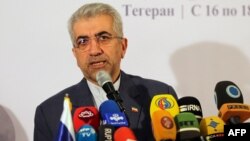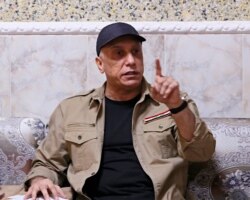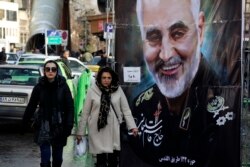Iraqi state TV announced Tuesday the country is suffering from a major electricity crisis following the drastic reduction of natural gas supplies by Iran, from 50 million to 5 million cubic meters.
Tehran says Baghdad must pay at least several billion dollars of an estimated $5 billion debt it owes Tehran for natural gas and electricity.
Iranian Energy Minister Reza Ardakanian met top Iraqi officials, including Electricity Minister Majid Hantush and Central Bank Governor Mustapha Ghaleb, during a visit to Baghdad on Tuesday to discuss the crisis.
Iranian Revolutionary Guard Commander Mustapha Qa'ani reportedly also met with Tehran's Shi'ite militia allies in Baghdad during the past several days.
The visits come amid tensions between Iraqi Prime Minister Mustapha Kadhimi and pro-Iranian Shi'ite militia commanders, including Qais al Khazali, leader of the Asa'ib Ahl al Haq militia, over the arrest of militia members accused of firing rockets at the U.S. embassy compound in Baghdad.
Iranian government spokesman Ali Rabiei said in a press conference Tuesday in Tehran that Iran has no ties to the militias firing rockets at the embassy and that Washington "knows that many different groups in Iraq want to end its occupation of the country." He accused the U.S. of provoking tensions in the region.
The spokesman said Washington is responsible for tensions in the Gulf, adding it must stop what he called its "cross-border intervention" and "adventurism" in the region.
Next week marks the first anniversary of a U.S. drone strike that killed top Iranian military commander General Qassem Soleimani as his convoy left Baghdad Airport. Some Iranian leaders and their Iraqi militia allies have vowed to avenge Soleimani's death.
Former Iranian President Abolhassan Bani Sadr told VOA the situation in Iraq is chaotic and the Iraqi government is both "financially bankrupt and politically paralyzed." For these reasons, he said he doubts Iran is trying to topple the government of Prime Minister Kadhimi.
He said toppling the regime only makes sense when there is a functioning government, but the state is paralyzed, and the government does not function. Iraq, he added, is now struggling to maintain both an internal equilibrium between Sunnis, Shi'ites and Kurds, and an external equilibrium between Iran, Saudi Arabia and Turkey.
Bani Sadr said that he doesn't think Iran will react on the one-year anniversary of the death of Soleimani, because it is "not militarily strong enough." Most Iranian government spokesmen, he said, are calling for "non-military revenge."
Acting U.S. Defense Secretary Christopher Miller said in November that U.S. forces inside Iraq would be drawn down to approximately 2,500 personnel by January 2021.



